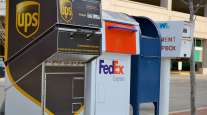UPS Ends 2017 With Strong Results

UPS Inc. reported robust fourth-quarter earnings, even after adjustments tied to pension contributions and the Tax Cuts and Jobs Act, led by double-digit growth in the freight and third-party logistics businesses and a strong holiday season.
The Atlanta-based company, which ranks No. 1 on the Transport Topics Top 100 list of the largest for-hire carriers in North America, posted a $1.1 billion profit, or $1.27 per share, in the quarter compared with a year-ago loss of $239 million, or 27 cents.
UPS recorded a $800 million, or 70 cents, mark-to-market pension adjustment. It also recorded a $258 million, or 30 cents, benefit from the tax law.
RELATED: UPS seeks driver ‘flexibility’ in contract talks with teamsters
Revenue jumped 11.2% to $18.8 billion.
Quarterly operating profit of $1.5 billion stemmed from strength in the domestic, international, supply chain and freight divisions. UPS also delivered a record 762 million shipments in the holiday season.
“In the fourth quarter, we produced one of the highest revenue growth rates of the last decade ... and we generated healthy returns on capital investments,” CEO David Abney said on a call with industry analysts.
Full-year profits surged 43% to $4.9 billion or $5.61 per share while revenue climbed 8.2% to $65.9 billion.
In the fourth quarter, U.S. domestic package revenue rose 8.4% to $11.8 billion, including growth in UPS Next Day Air, UPS Ground and UPS Deferred. Volume grew 5.4% to 20.6 million packages with the majority in the UPS Ground segment. Revenue per package improved 2.9% to $9.12 due to higher prices in 2017. After expenses, domestic operating income was $627 million, reversing a $570 million operating loss during the same quarter of 2016.
However, UPS admitted a flurry of e-commerce activity in the week after Thanksgiving overwhelmed its delivery network, forcing shoppers to wait longer for their orders.
“That old saying that ‘rising tide lifts all boats,’ that is the thing that we were facing. If it was two or three large customers, or it’s 20 large customers, the control tower can be very effective in those regards. But this was not just the large customers, this was throughout the network,” Abney said. “So that’s why we’ve got to really take a look Cyber Week.”
International package revenue jumped about 13% to nearly $3.8 billion in the quarter and operating income surged 158% to $725 million. Volume increased 8.3% to nearly 3.5 million packages and revenue per piece went up 4.2% to $16.57.
UPS International President James Barber said the market will eventually surpass the domestic market as the top income generator.
“Personally, I think that, at some point in the future, as our business continues to diversify, international would probably become bigger and larger for shareholders than domestic,” he said. “The world continues to move, cross-border continues to grow seven times as fast as most the domestics economies. The trick is to be there at the right time at the right place.”
UPS said in 2018, it will add six 747-8 aircraft and three converted 767 freighters to the fleet.
“If you think about the value creation of our air products and our international products, and it’s apparent that that’s an area where we want to invest as much as we can, as often as we can, because it does bring return very quickly to the bottom line. And so now we’re going to have a total of almost 28 747s as well as about seven 767s that we’ve announced,” Chief Financial Officer Richard Peretz said.
UPS Supply Chain Solutions revenue jumped 25% to $2.3 billion. UPS Freight revenue rose 11% to $758 million. Operating income of the combined supply chain and freight was $142 million, a sharp turnaround from a $139 million loss in the same quarter of 2016.
Less-than-truckload revenue grew 8.1% to $653 million and volume for the quarter edged up 0.7% to nearly 2.5 million shipments. Weight per shipment increased 2.1% to 1,076 pounds.
After the earnings call, Teamsters Local 2727 President Tim Boyle sharply rebuked management over spending priorities. He represents aircraft mechanics in a bitter dispute with UPS over a new contract currently before the National Mediation Board.
“Yet while companies like FedEx quickly announced a $3.2 billion investment in employee wage increases, bonuses, pension funding and growth of its U.S. operations, UPS executives refuse to invest in their workforce and are asking the aircraft maintenance workers, who keep UPS planes flying, to agree to cuts in their health care and minimal raises after four years of having wages frozen,” Boyle said. “Mechanics will no longer tolerate these broken promises and stand more united than ever to do whatever it takes to hold UPS accountable for its actions.”




